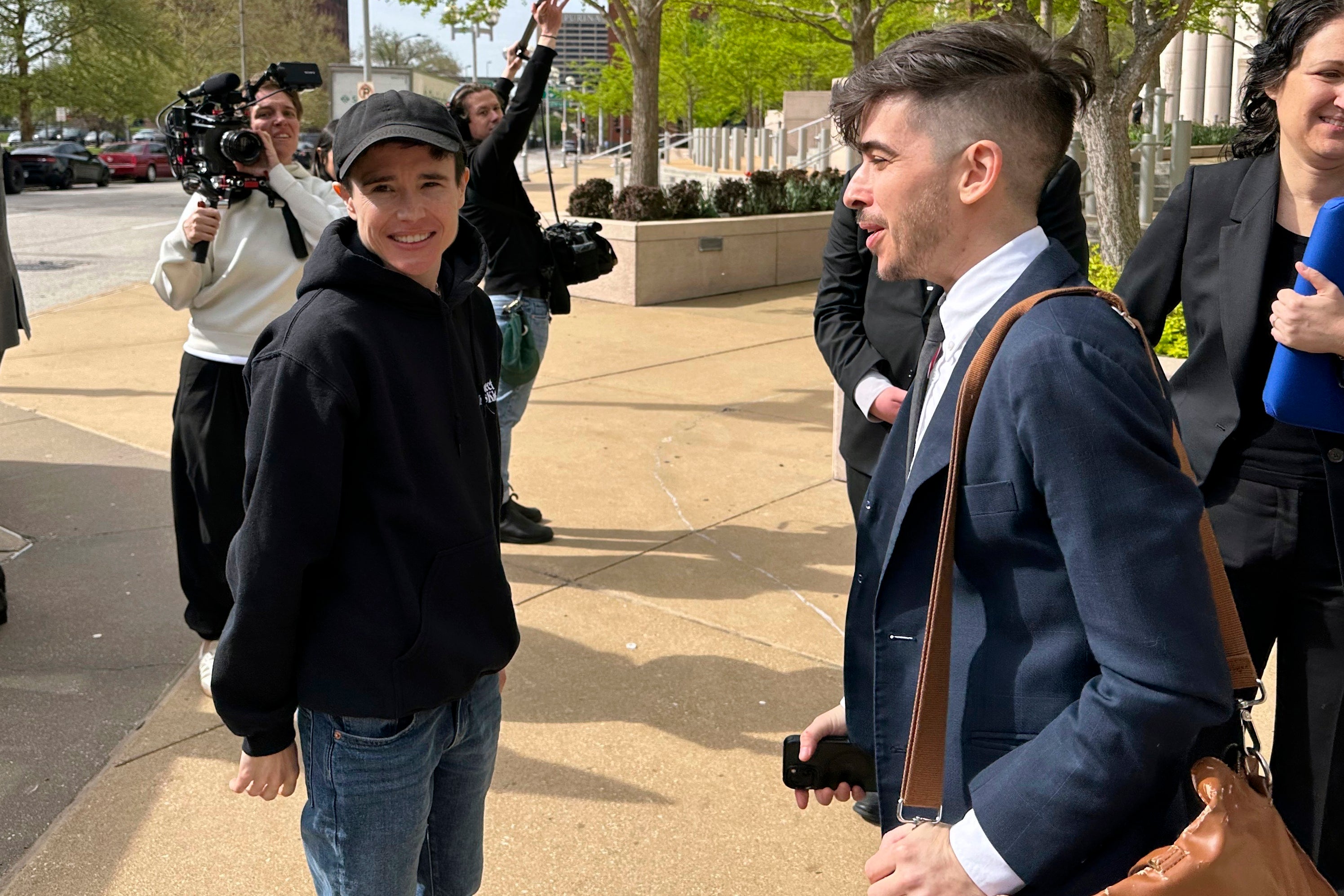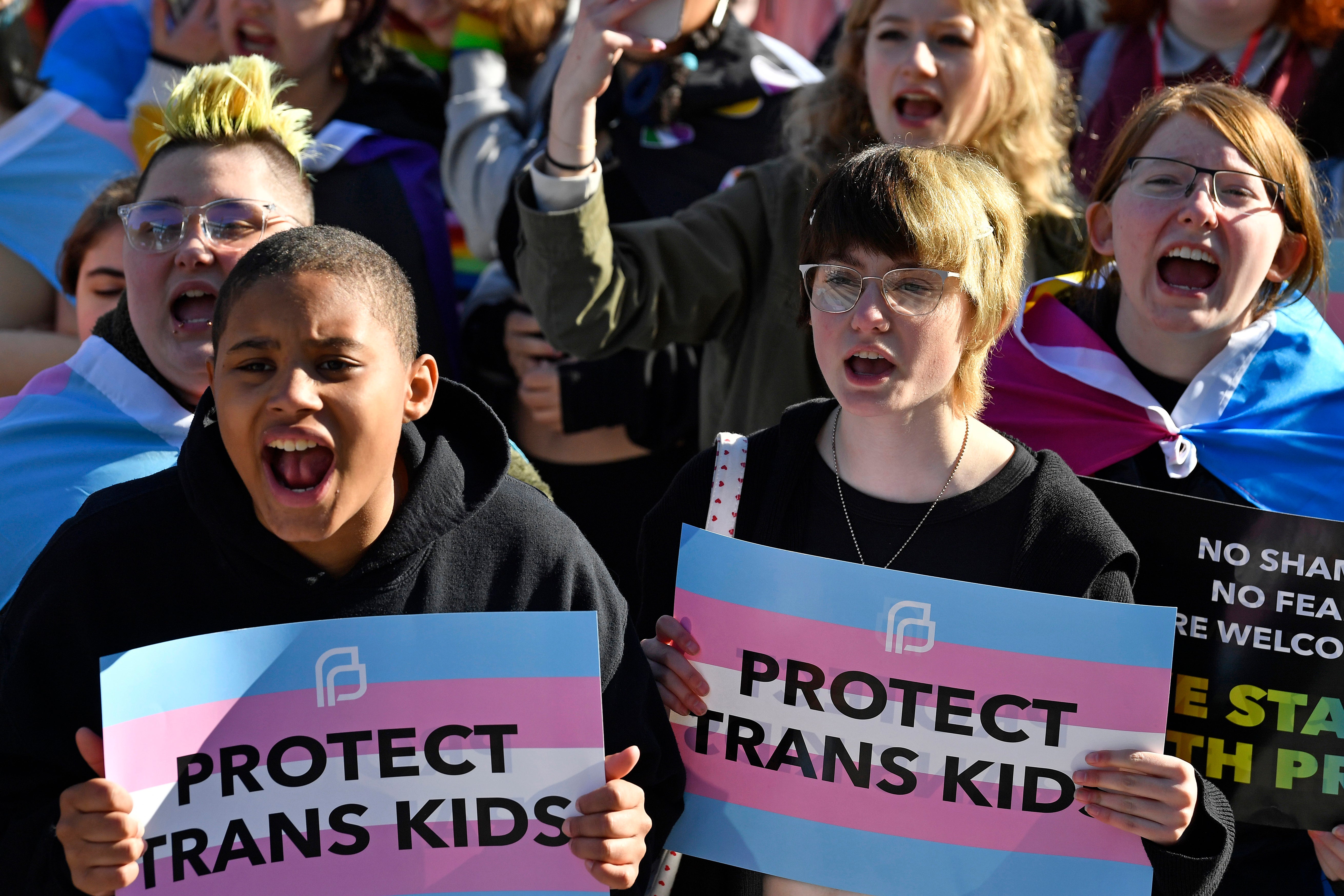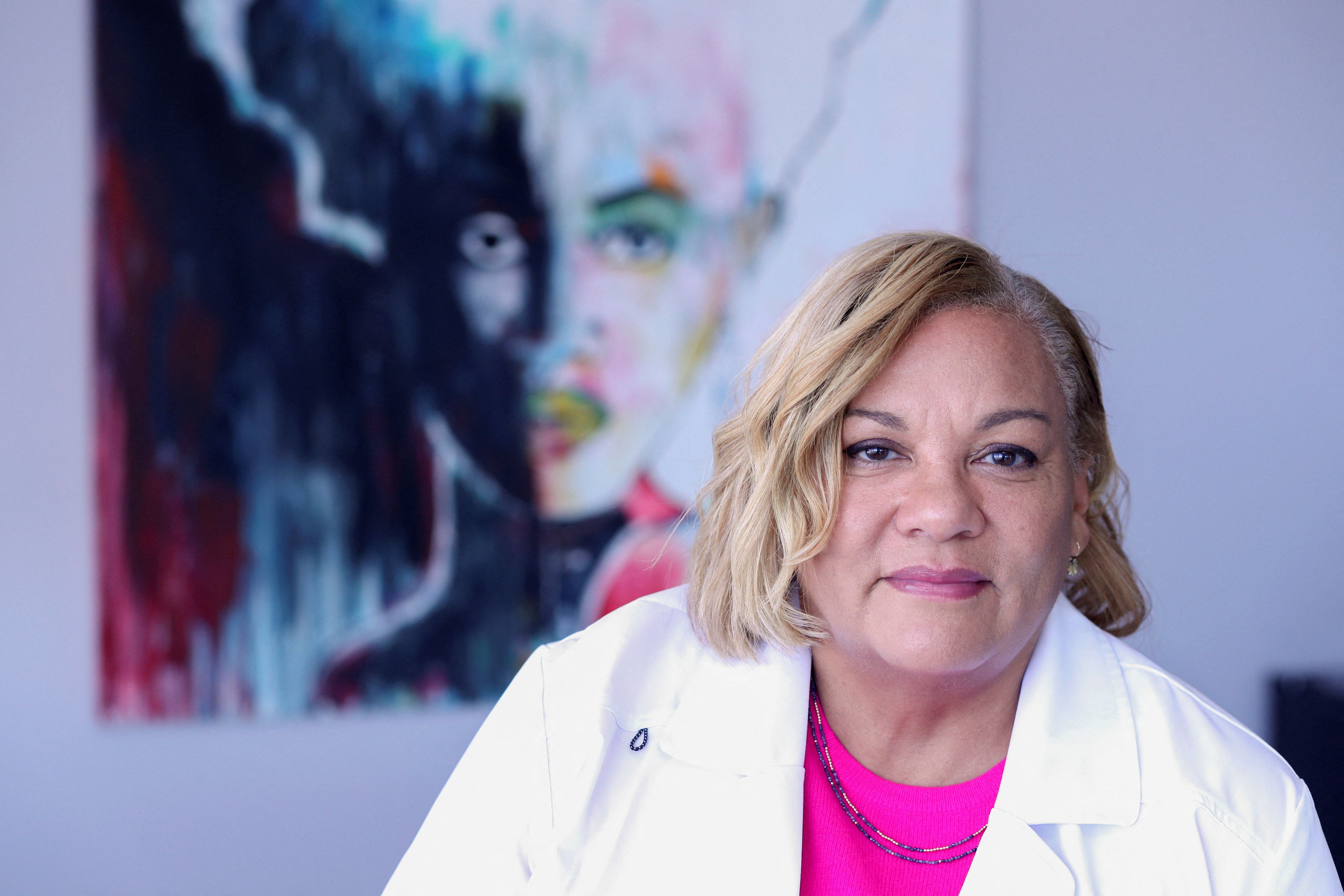Brian Williams’s 16-year-old daughter L.W. loves playing video games with her little brother. She’s designing some herself as she begins considering college.
But “her smile and her confidence would not be what they are if it were not for the healthcare we and her doctors know is right for her,” according to her father.
Three years ago, after months of conversations and consultations with physicians and L.W. herself, she began taking puberty-blocking medications, followed by hormone therapy a year later.
But a federal appeals court ruling last year upheld a law banning gender-affirming healthcare for trans teens such as L.W. in their home state of Tennessee, forcing the family to travel out of state to see her doctors. The trips are getting harder as they hunt for providers after an avalanche of state laws targeting gender-affirming care.
“We know we are fortunate to be able to maintain access because of this, and our heart breaks for the families like ours, who cannot and must instead watch their child suffer knowing that a better way is possible,” Williams told reporters. “Tennessee’s ban on gender-affirming medical care is an active threat to the future my daughter deserves. It infringes not only on her freedom to be yourself, but on our family’s love for her.”
The Williams family and two others with transgender children are now at the center of a groundbreaking case in front of the Supreme Court, where justices are considering their challenge to Tennessee’s ban on gender-affirming care for trans minors.
Justices heard oral arguments on December 4. A decision, expected by summer 2025, could have far-reaching consequences for protections against sex discrimination, while Donald Trump and his anti-trans crusade return to the White House with a Republican-controlled Congress that civil rights advocates and LGBT+ Americans fear intends to strike trans people from public life.
Within months, the government will effectively reverse its position in the case. President Joe Biden’s administration has joined the legal battle to overturn Tennessee’s ban and anti-trans laws more broadly. Trump, meanwhile, wants to strip vital protections for LGBT+ Americans, block trans students from playing sports or using bathrooms that align with their gender identities, and make affirming healthcare for trans youth illegal nationwide.
In United States v Skrmetti, Supreme Court justices will be asked to decide whether discrimination against trans people qualifies as unconstitutional sex discrimination under the 14th Amendment’s equal protection clause. If so, Tennessee’s law — and likely other laws targeting affirming healthcare — will fail.
But a decision that upends healthcare for families such as L.W.’s could be catastrophic. An appeals court decision that sided with Tennessee’s ban appeared to open the door to eliminating discrimination protections on the basis of sex altogether.
“We are not expecting anyone to understand everything about our family or the needs of transgender young people like L.W.,” Williams said. “What we are asking for is for her freedom to be herself without fear. We are asking for her to be able to access the healthcare she needs and in her adulthood, knowing nothing is holding her back because of who she is. At the very least, we’d ask others to do what we did all those years ago when L.W. first came out to us: open your hearts and listen.”

In 2020, medically necessary gender-affirming healthcare was available to transgender young people in every state. Within four years, that same healthcare was outlawed in nearly half of states, after hundreds of bills targeting LGBT+ young people flooded statehouses on a wave of anti-trans rhetoric that dominated campaign messaging into the 2024 presidential election.
South Dakota was the first state to introduce an outright ban. Arkansas was the first to make one law. By the end of 2024, 26 states have made affirming care for trans minors illegal. Nearly 40 percent of trans youth aged 13 to 17 — roughly 119,000 children — are living in those states, according to the Human Rights Campaign.
Major medical organizations including the American Academy of Pediatrics, the American Medical Association, American Academy of Child and Adolescent Psychiatry and American Counseling Association, among others, agree that such care is clinically appropriate for trans youth experiencing gender dysphoria. Medical guidelines generally say that affirming surgeries should only be approved for people ages 18 and older, and they are rarely, if ever, performed.
Dr. Susan Lacy, a Memphis-based physician who is among plaintiffs challenging Tennessee’s law, has treated dozens of trans patients, most of whom have struggled with gender dysphoria for years before arriving at her office.
“Not only have they been dealing with the distress of gender dysphoria, they have also had to move past shame, fear and the ignorance of others, before mustering the strength to give voice to their own pain,” she said.

If Tennessee’s ban is allowed to stay in place, Lacy fears for families who are forced “to watch their children suffer knowing treatment for that suffering has been denied to them by politicians.”
Last year, a federal appeals court refused to block Tennessee’s law that prohibits doctors from prescribing affirming care such as puberty blockers, hormone therapy and surgeries to trans youth. A dissent written by George W. Bush-appointed appellate Judge Helene White argued that such bans “effectively reveal that their purpose is to force boys and girls to look and live like boys and girls.”
Opponents of the ban argue that it unconstitutionally singles out trans patients. Treatments that make up a medical transition are also regularly prescribed to cisgender people, often to help them align their bodies with gender expectations; hormone replacement therapy is frequently used to treat disorders such as polycystic ovary syndrome, or to stop unwanted bodily changes and alleviate menopause, while puberty blockers can be used to slow down puberty that advances too quickly in non-trans children.
The Supreme Court’s 2020 ruling in Bostock v Clayton County affirmed that anti-trans discrimination is a form of sex discrimination, an argument echoed in federal court rulings across the country that have struck down similar gender-affirming care bans.
In that decision, conservative justice Neil Gorsuch and Chief Justice John Roberts joined four liberal justices appointed by Democrats in affirming that the 1964 Civil Rights Act’s prohibition on employment discrimination “because of sex” must also protect people from discrimination on the basis of gender identity and sexuality.
“It is impossible to discriminate against a person for being homosexual or transgender without discriminating against that individual based on sex,” Gorsuch wrote at the time.
But that was 2020. The court is now made up of three Trump appointees among the six conservative justices on the nine-member panel.

“This is a government-imposed, one-size-fits-all ban uprooting people’s lives, alarming doctors and medical experts, and endangering the very young people they claim to protect, like our adolescent clients in these cases,” according to Chase Strangio, co-director of the ACLU’s LGBT & HIV Project.
“The law’s prohibition is not based on any sex-neutral criteria like risk or evidence of efficacy, but instead on whether a course of treatment departs from what is expected for people based on their sex at birth,” he added. “We are simply asking the Supreme Court to recognize that when a law treats people differently based on their sex, the same equal protection principles apply — regardless of whether the group impacted by the law happens to be transgender.”
That ruling wouldn’t be breaking any new ground, Strangio and civil rights groups have argued. It would simply reaffirm that the Constitution guarantees equal application of the law.
The case asks “whether the government has the right to restrict how people’s bodies are treated, how people have control over their own bodies,” according to Casey Pick, director of law and policy for LGBT+ advocacy group The Trevor Project.
“Can you get the medication your children need if that is politically unpopular? The throughline there is whether our Constitution protects our right to control over our own bodies, our own health care, and that’s really what’s at issue today,” she told The Independent. “The Skrmetti case has been centering on transgender youth and their families, but the broader question at issue here really is one that should concern all Americans.”

Tennessee and other Republican-led states have argued their bans on trans healthcare are not discriminatory because both trans boys and girls are denied those treatments, and the laws are intended to protect minors from making premature decisions about what they claim is experimental or potentially risky healthcare.
The challenge is supported by a long list of right-wing groups and conservative Christian organizations, Including Alliance Defending Freedom, the legal group that led the challenge that overturned Roe v Wade and has helped advance anti-trans laws across the country.
The alliance is among a network of right-wing legal groups and influential Evangelical Christian organizations that worked closely with state legislatures and members of Congress to advance anti-trans legislation after the Supreme Court affirmed marriage equality in 2015.

Stories from parents with trans teens have filled up the Supreme Court’s docket. Jenny, a 16-year-old from Texas, started estrogen therapy, which significantly improved her mental health as she “gradually started feeling happier with the feminine changes in her body,” according to her family.
But the impacts of Texas’s anti-trans legislation “terrified” the family; her father was forced to stay behind for work while Jenny and her mother moved to Oregon. Texas law caused them “nothing but harm,” her family wrote.
Fourteen-year-old Richard was on testosterone when the state’s ban passed, forcing his family to make regular and expensive trips to New Mexico to continue his care. Seventeen-year-old Owen from Tennessee received care from Cincinnati Children’s Hospital in neighboring Ohio, which passed its own ban, forcing the family to travel to Illinois.
Rick Colby’s son called him “near suicide” while he was at college in Ohio in 2012. The self-described conservative Republican jumped in his car to get him, beginning a “years-long process of helping my son transition and become the person he was always meant to be, which is a man,” Colby said on December 2.
“I didn’t have a frame of reference for what I was dealing with, but with [my son] as my guide, we figured it out together and got him to a great place, where he’s thriving today, where he has his own business, and I’m very proud of him,” he said. “Yes, I’m a Republican, but first and foremost, I’m a parent, and a dad.”
A sweeping survey of more than 60,000 trans and nonbinary young people between ages 13-24 discovered a direct causal relationship between anti-trans laws and heightened rates of suicidality.
The report, published in Nature Human Behavior and conducted by The Trevor Project, found that state laws caused an increase in suicide attempts among trans and nonbinary youth by up to 72 percent.
“It’s not because young people are trans. It’s because they are being treated like political pawns,” Pick said.
“The last few months in particular have seen a tremendous amount of misinformation, stereotypes and stigma,” she told The Independent, pointing to a 700 percent increase in calls to the group’s crisis services in the wake of Election Day.
“Are we concerned that this is another opportunity for damaging hateful rhetoric? Of course we are,” she said. “But this is also an opportunity for more Americans to really learn and understand what is at issue here, which is the health and well being of our young people.”







